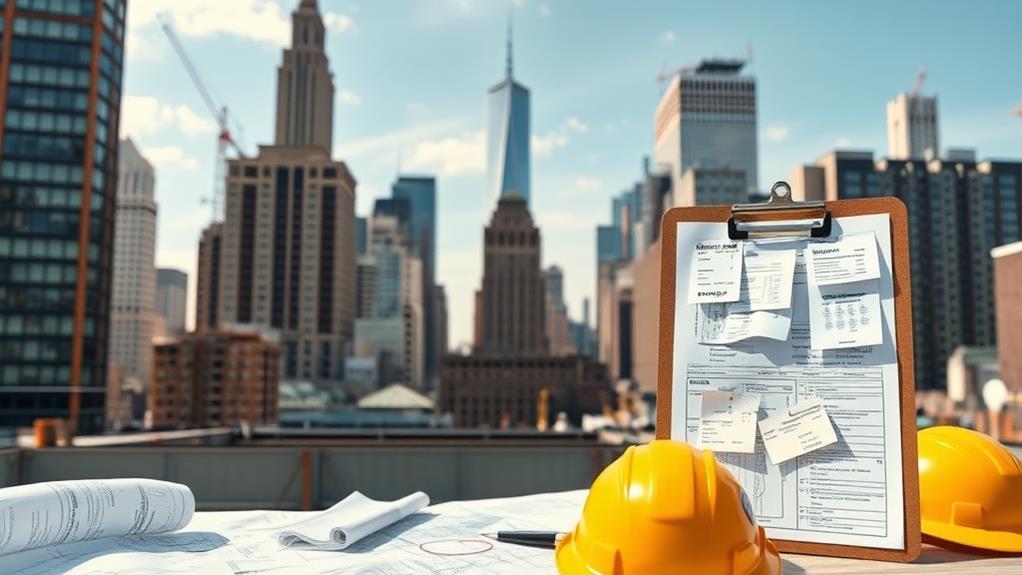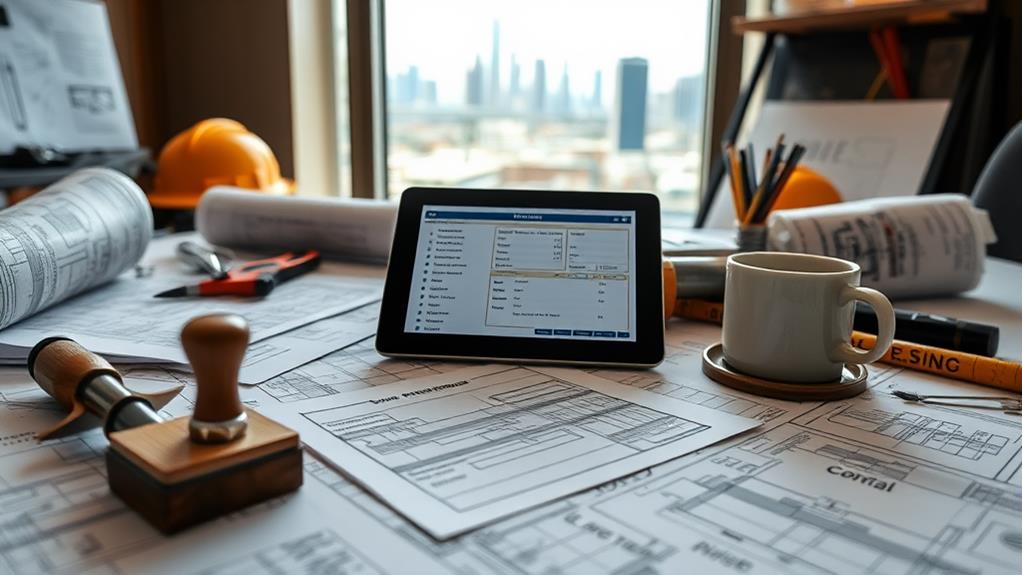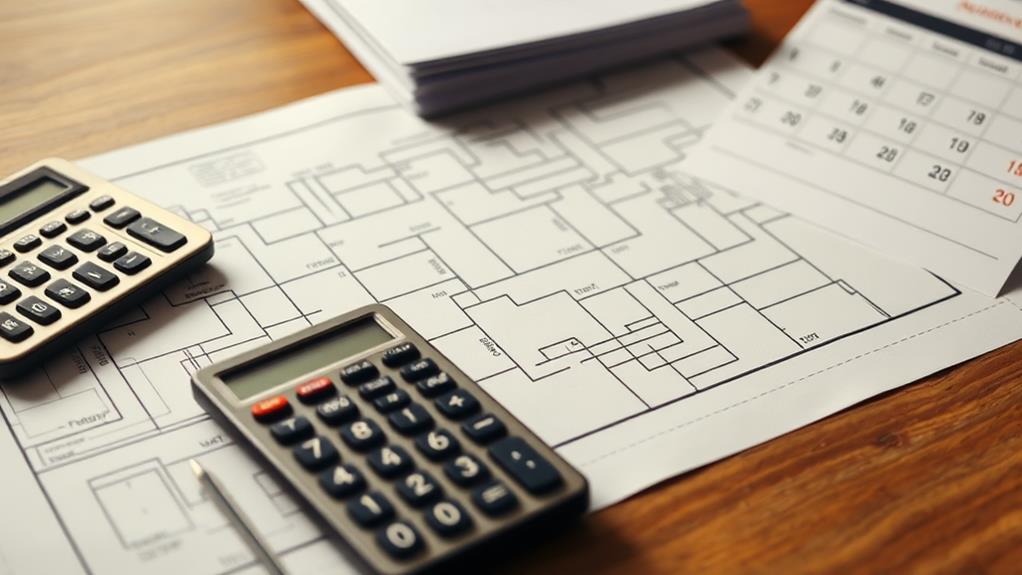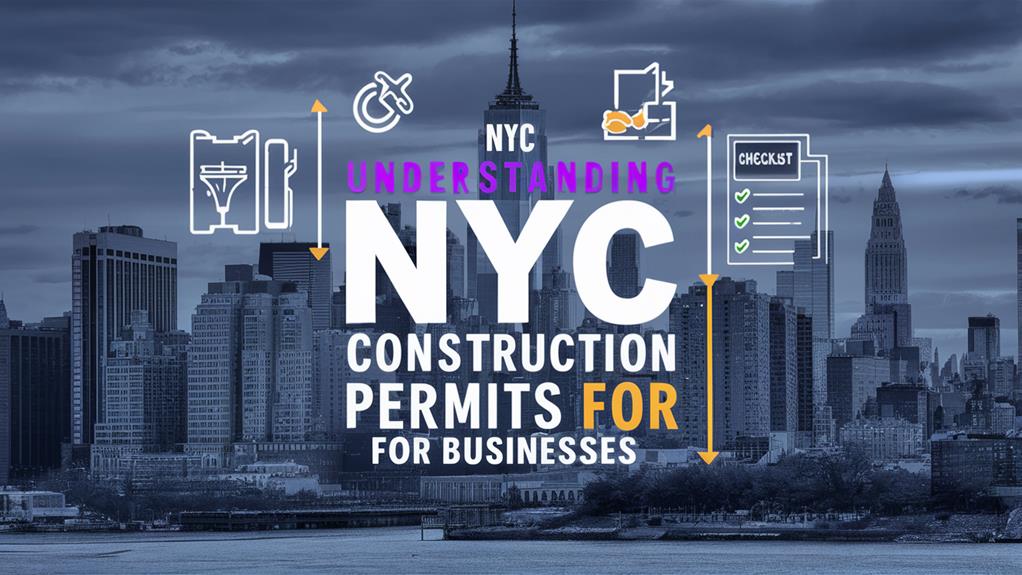NYC construction permits are required for businesses looking to build, renovate, or demolish structures. You'll need to submit your application online through the Department of Buildings (DOB) platform, where various permits like New Building, Alteration, and Demolition are available. The average processing time ranges from 1 to 3 months, but simpler projects may take as little as 3-4 weeks. Compliance with NYC's Building Code is crucial, as DOB conducts inspections to ensure safety. Obtaining a permit also leads to a Certificate of Occupancy, confirming your project's legality. There's much more you can explore about the permitting process.
Overview of NYC Construction Permits

When you're planning a construction project in New York City, understanding the permit process is crucial. NYC construction permits are mandatory for new buildings, significant renovations, demolitions, and specific alterations. This ensures your project complies with safety and building codes, which is especially important for commercial construction expertise.
To begin, you'll need to submit a permit application through the Department of Buildings (DOB) online platform. This application requires detailed project plans, contractor information, and various compliance documents.
Different types of permits cater to various construction activities, including New Building (NB), Alteration (Alt), and Demolition permits. Each type comes with its own fees and processing times. On average, you can expect the permit processing to take between 1 to 3 months, although expedited options are available for certain projects.
During the construction process, regular inspections are conducted to ensure everything meets safety standards. Once your project is complete, you'll receive a Certificate of Occupancy, confirming that your construction complies with all regulations.
Understanding this permit process helps you navigate the complexities of construction in NYC, ensuring that your project runs smoothly from start to finish.
Types of Construction Permits
Understanding the different types of construction permits is essential for any business planning a project in NYC. There are several categories you should be aware of.
First, a New Building (NB) permit is required if you're constructing a new structure, which is often part of the ongoing urban transformation in NYC. If you're modifying an existing building, you'll need an Alteration (Alt) permit. For projects involving the demolition of a structure, a Demolition permit is necessary.
In addition to these primary permits, you may also need specialty permits for specific tasks, such as electrical, plumbing, or scaffolding work. Each of these requires a separate application, so be prepared for that.
Once your project is complete, you'll need a Certificate of Occupancy to confirm that everything meets NYC regulations and safety standards.
Keep in mind that the average processing time for these construction permits can range from 1 to 3 months, depending on the complexity of your project. Lastly, fees vary significantly based on project size and type, ranging from hundreds to thousands of dollars.
Knowing these types of permits can help you navigate your construction project more smoothly.
Application Submission Process

Submitting a construction permit application in NYC is a key step in moving your project forward. To begin, you'll need to gather details about the construction work you plan to undertake. This includes necessary plans, contractor information, and any other relevant documents.
You must submit your application online through the Department of Buildings' (DOB) website, which is now more efficient due to the DOB NOW platform. Effective project management is essential during this phase to ensure all aspects are covered, including comprehensive planning.
Once you submit your application, the review process starts. For simple applications, expect a review time of about 1-3 months, while more complex requests may take longer.
It's crucial to keep an eye on your application's status, as daily updates are available to track its progress. This way, you can stay informed about any modifications or requirements that may arise.
Obtaining your permit is essential for ensuring your construction work complies with NYC's Building Code. So, make sure you follow all the steps carefully and provide thorough information in your application.
Compliance and Inspection Requirements
Ensuring compliance with NYC's Building Code is crucial for the success of your construction project. In New York City, all construction activity requires adherence to safety regulations and established standards.
The Department of Buildings (DOB) plays a key role in this process by conducting inspections at various stages of your project. These inspections verify that your work meets the approved plans and safety requirements, so you'll want to stay on top of these inspection requirements.
If you fail to comply with these regulations, you could face fines, permit revocation, or even delays in your project. That's why it's essential to ensure that you meet all compliance criteria throughout the construction process.
Regular updates on inspection results are provided to applicants, maintaining transparency and accountability.
Once your project is completed, you'll need a Certificate of Occupancy. This certificate confirms that all work complies with relevant codes and regulations, allowing your space to be legally occupied.
Keeping track of your inspections and ensuring compliance will help you avoid issues and ensure a smoother process from start to finish.
Permit Costs and Timelines

After navigating the compliance and inspection requirements, it's vital to grasp the costs and timelines associated with obtaining construction permits in NYC. Understanding these aspects helps you plan your construction projects effectively.
Here are some key points to consider:
- Permit costs can range from hundreds to thousands of dollars.
- The average processing time for permits is typically 1 to 3 months.
- More complex projects may take longer due to their complexity.
- Permits are valid for the duration of the project, up to two years.
When you fill out your application, remember that the specifics of your project can greatly influence both the permit costs and the processing time.
For simpler projects, like Alteration-1 self-certification, you might see approval in just 3-4 weeks. However, if your project requires landmark approval or is more complex, you could wait 3-4 months.
It's essential to factor these timelines into your planning. By staying informed about permit costs and processing times, you can keep your construction projects on track and avoid delays.
Benefits of Using Permit Expediters
Navigating the complexities of NYC's construction permitting process can be daunting, but using a permit expediter simplifies it significantly. These experienced professionals streamline the application process, reducing the average permit processing time from several months to just weeks, depending on your project's complexity.
By leveraging their in-depth knowledge of NYC regulations, permit expediters help ensure your applications are complete and compliant, minimizing the risk of delays from the Department of Buildings (DOB).
One major benefit of using permit expediters is the significant cost savings they can provide. They help you avoid potential fines related to permit violations and work stoppages due to non-compliance.
Additionally, their established relationships with DOB staff can facilitate faster approvals and better communication throughout the permitting process.
On average, businesses that utilize permit expediters experience a higher success rate in obtaining necessary permits on the first submission. This enhances project timelines and operational efficiency.
With a permit expediter by your side, you can navigate the permitting landscape more effectively, ensuring your project remains on track and compliant with all NYC regulations.
Conclusion
In conclusion, navigating NYC construction permits for businesses can feel like solving a complex puzzle. Understanding the types of permits, the application process, and compliance requirements is essential for a smooth experience. By being informed about costs and timelines, you can plan effectively. Additionally, considering a permit expediter can save you time and reduce stress. Remember, having the right permits is not just a formality; it's crucial for your project's success and your business's growth.


Leave a Reply